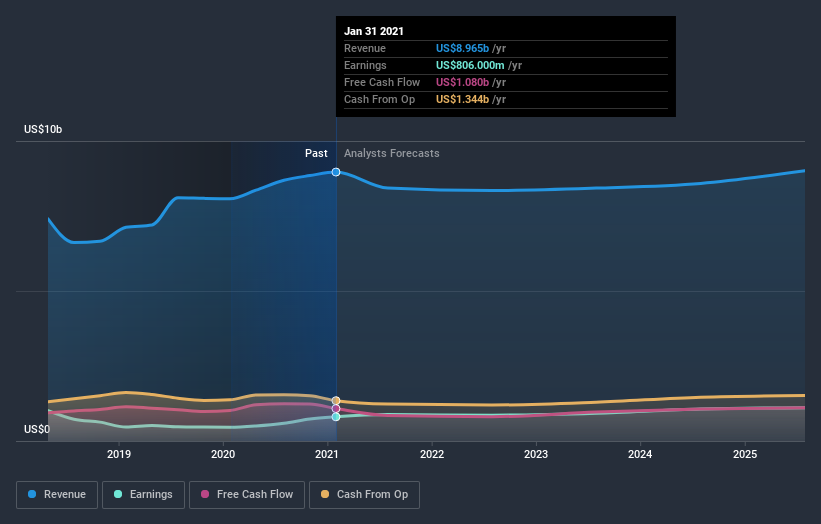Here's What Analysts Are Forecasting For Campbell Soup Company (NYSE:CPB) After Its Second-Quarter Results
It's been a good week for Campbell Soup Company (NYSE:CPB) shareholders, because the company has just released its latest quarterly results, and the shares gained 2.9% to US$47.96. It was a credible result overall, with revenues of US$2.3b and statutory earnings per share of US$0.80 both in line with analyst estimates, showing that Campbell Soup is executing in line with expectations. Earnings are an important time for investors, as they can track a company's performance, look at what the analysts are forecasting for next year, and see if there's been a change in sentiment towards the company. We thought readers would find it interesting to see the analysts latest (statutory) post-earnings forecasts for next year.
Check out our latest analysis for Campbell Soup
Taking into account the latest results, the current consensus, from the 14 analysts covering Campbell Soup, is for revenues of US$8.43b in 2021, which would reflect a discernible 5.9% reduction in Campbell Soup's sales over the past 12 months. Per-share earnings are expected to increase 9.4% to US$2.91. Yet prior to the latest earnings, the analysts had been anticipated revenues of US$8.40b and earnings per share (EPS) of US$2.89 in 2021. So it's pretty clear that, although the analysts have updated their estimates, there's been no major change in expectations for the business following the latest results.
There were no changes to revenue or earnings estimates or the price target of US$50.34, suggesting that the company has met expectations in its recent result. The consensus price target is just an average of individual analyst targets, so - it could be handy to see how wide the range of underlying estimates is. The most optimistic Campbell Soup analyst has a price target of US$59.00 per share, while the most pessimistic values it at US$40.00. These price targets show that analysts do have some differing views on the business, but the estimates do not vary enough to suggest to us that some are betting on wild success or utter failure.
Looking at the bigger picture now, one of the ways we can make sense of these forecasts is to see how they measure up against both past performance and industry growth estimates. These estimates imply that sales are expected to slow, with a forecast annualised revenue decline of 12% by the end of 2021. This indicates a significant reduction from annual growth of 2.3% over the last five years. By contrast, our data suggests that other companies (with analyst coverage) in the same industry are forecast to see their revenue grow 3.1% annually for the foreseeable future. It's pretty clear that Campbell Soup's revenues are expected to perform substantially worse than the wider industry.
The Bottom Line
The most obvious conclusion is that there's been no major change in the business' prospects in recent times, with the analysts holding their earnings forecasts steady, in line with previous estimates. Fortunately, the analysts also reconfirmed their revenue estimates, suggesting sales are tracking in line with expectations - although our data does suggest that Campbell Soup's revenues are expected to perform worse than the wider industry. There was no real change to the consensus price target, suggesting that the intrinsic value of the business has not undergone any major changes with the latest estimates.
Keeping that in mind, we still think that the longer term trajectory of the business is much more important for investors to consider. We have forecasts for Campbell Soup going out to 2025, and you can see them free on our platform here.
Plus, you should also learn about the 1 warning sign we've spotted with Campbell Soup .
This article by Simply Wall St is general in nature. It does not constitute a recommendation to buy or sell any stock, and does not take account of your objectives, or your financial situation. We aim to bring you long-term focused analysis driven by fundamental data. Note that our analysis may not factor in the latest price-sensitive company announcements or qualitative material. Simply Wall St has no position in any stocks mentioned.
Have feedback on this article? Concerned about the content? Get in touch with us directly. Alternatively, email editorial-team (at) simplywallst.com.

